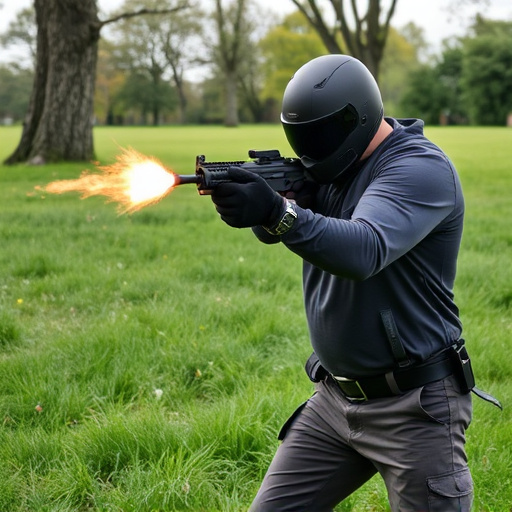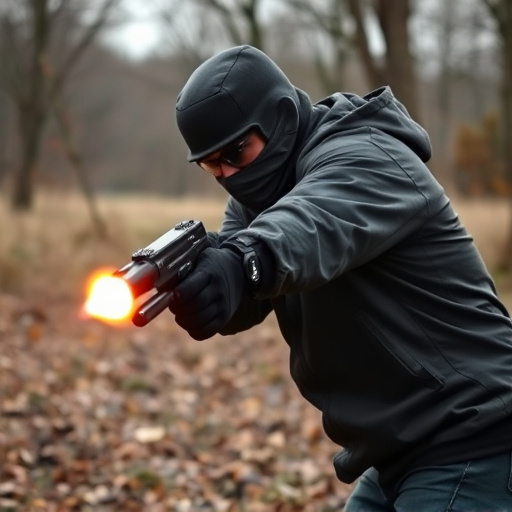Civilian ownership of stun devices like Tasers is heavily regulated due to their Neuromuscular Effects, which can cause temporary paralysis and respiratory distress. State laws vary in permit requirements, carrying restrictions, and legal implications for self-defense, emphasizing the need for responsible use and compliance. Background checks and safety training are crucial to mitigate risks, prevent misuse, and ensure the safe handling of these powerful tools.
In today’s world, civilian taser ownership is a topic of growing interest. Understanding the neuromuscular effects of stun devices is crucial before delving into state laws governing their possession. This article explores legal requirements for purchase and possession, emphasizing background checks as a vital component for safety. It also highlights training mandates ensuring responsible use, providing a comprehensive guide to navigating civilian taser ownership in various jurisdictions.
- Understanding Neuromuscular Effects of Stun Devices
- State Laws Governing Civilian Taser Ownership
- Legal Requirements for Purchase and Possession
- Background Checks: A Vital Component
- Safety Training Mandates for Responsible Use
Understanding Neuromuscular Effects of Stun Devices

The neuromuscular effects of stun devices, such as Tasers, are a critical aspect to understand for anyone considering civilian ownership. These devices disrupt muscle control by delivering electrical impulses that interfere with the nervous system’s signals to the muscles. This interference leads to temporary paralysis or muscle contractions, effectively immobilizing the target.
The impact on the body is rapid and intense, causing a range of physiological responses. The stun can result in loss of balance, falling, and even respiratory distress in some cases. It’s essential for potential owners to appreciate that while these devices are powerful tools for self-defense, they also carry significant risks, especially when used inappropriately or on individuals with certain medical conditions.
State Laws Governing Civilian Taser Ownership

In the United States, the ownership and use of Tasers by civilians are heavily regulated under state laws due to the device’s powerful neuromuscular effects. These laws vary widely across states, covering everything from permit requirements to restrictions on when and where a stun gun can be carried. Some states allow for unrestricted civilian ownership while others mandate obtaining a permit or license, often through a rigorous application process involving background checks and training.
The regulations also delineate the legal implications of using a Taser, including self-defense rules and restrictions on use against law enforcement officers or other authorized personnel. Understanding these state laws is crucial for civilians considering Taser ownership, as it ensures compliance with local regulations and promotes responsible use of such devices.
Legal Requirements for Purchase and Possession

In most states, the legal requirements for purchasing and possessing a Taser (or stun device) are stringent to ensure public safety. Potential buyers must typically be over a certain age, often 21 or older, and undergo background checks. Some regions also mandate proof of training or certification in the use of such devices to demonstrate proficiency and mitigate potential risks. These measures aim to prevent misuse by civilians and minimize the neuromuscular effects of stun devices.
The laws vary across states, with some permitting Taser ownership for self-defense purposes while others restrict their use to law enforcement agencies. Certain jurisdictions even have specific provisions for qualified individuals, such as those in security or private protection roles, who may legally acquire and carry these devices. Understanding and adhering to these legal requirements are essential steps before considering the acquisition of a Taser to ensure compliance with state regulations.
Background Checks: A Vital Component

Background checks are a crucial component in regulating civilian access to stun devices, particularly tasers. These checks serve as a critical layer of safety, aimed at preventing unauthorized individuals from obtaining such powerful tools. The neuromuscular effects of stun devices can be significant, temporarily incapacitating targets through the disruption of motor control and sensory perception. Implementing robust background check procedures ensures that only responsible individuals with no criminal intent or history of violence are permitted to own and use these devices.
Moreover, thorough background investigations help in identifying potential risks associated with individual ownership, such as a history of mental health issues or substance abuse, which might compromise safe usage. By screening prospective owners, state laws can effectively regulate the civilian possession of tasers, balancing the benefits of self-defense and personal safety against the risk of misuse and accidental harm.
Safety Training Mandates for Responsible Use

Many states that allow civilian ownership of tasers also mandate safety training for responsible use. This training is crucial to understanding the neuromuscular effects of stun devices and ensuring their safe deployment. The courses typically cover proper handling, activation techniques, and de-escalation strategies, emphasizing the device’s potential risks and benefits.
Instructors trained in these programs educate users on how to minimize the risk of injury, both to the target and bystanders. They also delve into legal considerations, such as when and where tasers can be used, further empowering individuals to use this force-enhancing technology responsibly and within legal boundaries.
The regulation of civilian taser ownership varies across states, but all share a common goal: ensuring these powerful tools are used responsibly. By understanding the neuromuscular effects of stun devices and adhering to strict legal requirements, including background checks and safety training, individuals can navigate state laws effectively. This enables them to exercise their rights while minimizing potential risks associated with taser ownership.
